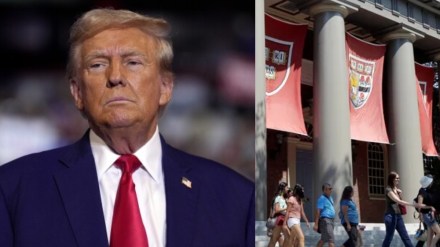The controversy between US President Donald Trump and Harvard University has escalated significantly in 2025, reflecting a broader confrontation over university governance, federal oversight, and ideological control. Rooted in long-standing cultural and political divides, the dispute has now snowballed into a legal and political standoff that could reshape the landscape of American higher education.
Student visa revocation deepens crisis
On May 22, 2025, tensions escalated when the Department of Homeland Security revoked Harvard’s authority to enroll international students, affecting roughly 6,800 foreign enrollees. Citing campus safety concerns tied to anti-American protests and reported acts of antisemitic violence, DHS also accused Harvard of aiding the Chinese Communist Party, referencing a 2024 training program for members of the Xinjiang Production and Construction Corps.
This revocation effectively ended Harvard’s certification under the Student and Exchange Visitor Program, jeopardizing the legal status of current international students and sparking global alarm in the academic community.
Harvard strikes back in court
Harvard quickly filed a lawsuit against the Trump administration, calling the funding freeze and visa revocation unconstitutional. A federal judge issued a temporary injunction, allowing international students to remain enrolled during ongoing litigation. The university defended its DEI initiatives as vital to maintaining a diverse and inclusive academic environment.
From Gaza to Cambridge: The roots of the conflict
The seeds of this conflict trace back to the October 7, 2023 attack on Israel and the subsequent Gaza offensive, which caused over 53,000 Palestinian deaths. In the wake of escalating pro-Palestine protests on campuses, then-Harvard President Claudine Gay was summoned to Congress. Facing severe backlash for her handling of the protests, Gay resigned, and Alan Garber assumed the presidency in August 2024.
Returning to the presidency in January 2025, Trump wasted no time in pursuing his campaign promises: dismantling DEI programs, suppressing pro-Palestine activism, and confronting what he labeled as “woke ideology” in higher education. A flurry of executive orders soon followed, directing federal agencies to target private institutions, especially elite universities, on these grounds.
Conspiracy theories and Barron Trump’s college rejections
Adding fuel to the controversy were viral social media claims that Trump’s actions were driven by personal resentment after his son, Barron Trump, was reportedly rejected by Ivy League universities.
Trump's just angry that even his rich dad couldn't get him into Harvard.
President Obama got into Harvard.
— Alex Cole (@acnewsitics) April 15, 2025
Although unverified, reports suggest Barron applied to Harvard but was not accepted. He is currently enrolled at NYU’s Stern School of Business.
Unauthorised demands and letter controversy
Further complicating matters, Harvard received a controversial letter on April 11 from the Trump administration, outlining demands that included overhauling admissions, terminating DEI efforts, and reshaping curriculum in exchange for the restoration of federal funding. The New York Times reported the letter was “unauthorized,” citing internal confusion within the White House over whether it was meant to be sent.
Despite the disavowal, Harvard treated the letter as official, noting it was signed by three federal officials and sent via a government email address. In response, President Garber firmly rejected the demands, asserting that Harvard would “not surrender its independence or relinquish its constitutional rights.”
Wider implications for higher education
The legal and political showdown between the Trump administration and Harvard has become a symbolic battleground for the future of higher education in America. It raises urgent questions about the limits of federal power over academic institutions and the protection of academic freedom amid rising ideological polarisation.
While critics view Trump’s actions as an authoritarian misuse of power to enforce ideological conformity, supporters argue that universities must be held accountable for systemic bias and lack of transparency. The case now unfolding in court may set a precedent for how much influence political administrations can exert on private educational institutions.
In April 2025, the Trump administration froze approximately $2.2 billion in federal research grants and $60 million in contracts allocated to Harvard. Officials cited non-compliance with federal standards regarding admissions, hiring, and diversity, equity, and inclusion (DEI) programs. Critics interpreted the move as a coercive measure to bring Harvard in line with the administration’s political agenda.
